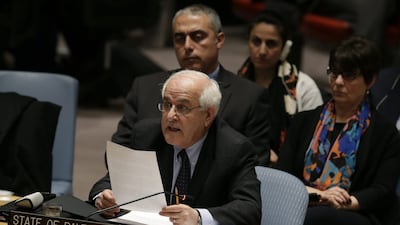Few peoples on Earth are in more desperate need of a coherent national strategy than the Palestinians, whose modern history is defined by dispossession, exile and occupation. Yet the diplomatic and political activities of their sole legitimate representatives, the Palestine Liberation Organisation, don’t merely suggest frustration, which is understandable given the daunting challenges and limited options Palestinians face. The PLO’s actions of late almost suggest there is no Palestinian strategy at all.
Recent Palestinian activity at the United Nations and other multilateral international institutions is a case in point but not the only evidence of drift. And moves for Palestine to join the International Criminal Court (ICC) are merely adding to the general state of confusion.
In recent weeks, Palestinians sought a UN Security Council resolution establishing an aspirational deadline to end the Israeli occupation that began in 1967 and for the creation of an independent Palestinian state. Had it passed, such a resolution would have reiterated and even amplified, the international community’s well-established expectation of an end to the occupation and a two-state solution.
But it wouldn’t have changed anything on the ground. Any such resolution, on its own and even if supported by the United States, would almost certainly be derisively ignored by Israel. It wouldn’t improve the life of a single Palestinian suffering under occupation, or bring forward the day of liberation. So it’s practical value, even in the best circumstances, would have been virtually nil.
But of course, the United States didn’t support the resolution, and made it clear that it was prepared to use its veto to block the text the Palestinians ultimately presented to the Security Council. Worse still, the symbolic value of the voting process was entirely negative for the Palestinians. A US veto would have been bad enough. But, in the event, it wasn’t necessary because nine votes were not achieved and the resolution was defeated without a veto.
Palestinian officials are on record as having understood that the present make-up of the Security Council was unlikely to pass the resolution and force a veto. Therefore, for most of the past few weeks, discussion focused entirely on efforts to negotiate a draft text acceptable to the United States, or to postpone the vote until after January when a new line-up, probably more sympathetic to the Palestinians, would take over at the Security Council. But last week, the Palestinians suddenly moved forward, although they now claim to have been surprised by some of the negative votes, particularly Nigeria’s.
The only way to make sense of this sudden shift is to assume that Palestinians came to believe that a compromise with the Americans wasn’t possible and, even at the risk of a humiliating diplomatic setback, it was better to bring the vote to a head under circumstances in which a US veto would not be an issue. This might help preserve relations with Washington.
But this interpretation has been undermined by Palestine’s request to join the ICC. The United States, many key European states and, of course, Israel, are all strongly on record against any such move, and the US Congress is already warning of potentially dire cuts in aid to the Palestinian Authority.
In any case, it would be a long, difficult and arduous process for Palestine, even if it joined the ICC, to arrange for any investigation, let alone prosecution, of Israeli officials. Having joined, Palestine would have to be deemed the practical sovereign in places like Gaza, and then deal with other difficult issues such as retroactivity of jurisdiction, and the political and diplomatic pressure facing prosecutors. Moreover, ICC membership could leave groups like Hamas vulnerable to potential investigation and prosecution as well.
The bottom line is that for Palestinians, seeking to use the ICC as leverage against Israel involves potential benefits, but that would require time-consuming and difficult effort that may never pay off. Meanwhile, the potentially substantial costs are front-loaded, and will presumably come into effect in the coming weeks.
Perhaps this is the coherent message the Palestinians are sending to Israel and the West through all of these baffling diplomatic contortions: that the PA has been left with so little that any significant moves to “punish” it by cutting aid, or by Israel withholding tax revenues, don’t matter that much because they are not plausible. This is because if the PA’s ability to govern were significantly undermined, that would only benefit Hamas.
So, perhaps Palestinians are indeed asserting their agency and demonstrating a certain degree of impunity. If so, that’s quite a gamble to achieve virtually no benefit. It could therefore be described as either daring or reckless. It’s certainly hard to avoid the whiff of desperation.
Palestinians and their profoundly moral cause are in deep trouble. Frustration and even outrage are understandable, and indeed legitimate, emotional reactions. But they urgently require a national strategy that harnesses the impeccable moral authority of their case, ensures they are seen as constructive partners by as much of the world as possible and, most importantly, can stand up to a basic cost-benefit analysis.
Hussein Ibish is a senior fellow at the American Task Force on Palestine
On Twitter: @ibishblog


